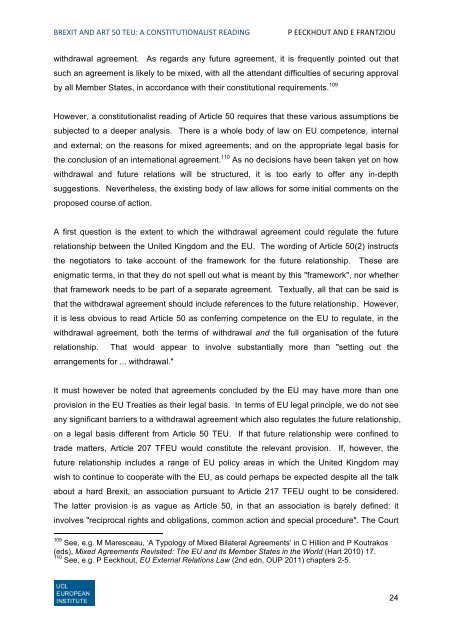brexit-article-50
brexit-article-50
brexit-article-50
You also want an ePaper? Increase the reach of your titles
YUMPU automatically turns print PDFs into web optimized ePapers that Google loves.
BREXIT'AND'ART'<strong>50</strong>'TEU:'A'CONSTITUTIONALIST'READING''''''''''''''''''''P'EECKHOUT'AND'E'FRANTZIOU'<br />
withdrawal agreement. As regards any future agreement, it is frequently pointed out that<br />
such an agreement is likely to be mixed, with all the attendant difficulties of securing approval<br />
by all Member States, in accordance with their constitutional requirements. 109<br />
However, a constitutionalist reading of Article <strong>50</strong> requires that these various assumptions be<br />
subjected to a deeper analysis. There is a whole body of law on EU competence, internal<br />
and external; on the reasons for mixed agreements; and on the appropriate legal basis for<br />
the conclusion of an international agreement. 110 As no decisions have been taken yet on how<br />
withdrawal and future relations will be structured, it is too early to offer any in-depth<br />
suggestions. Nevertheless, the existing body of law allows for some initial comments on the<br />
proposed course of action.<br />
A first question is the extent to which the withdrawal agreement could regulate the future<br />
relationship between the United Kingdom and the EU. The wording of Article <strong>50</strong>(2) instructs<br />
the negotiators to take account of the framework for the future relationship. These are<br />
enigmatic terms, in that they do not spell out what is meant by this "framework", nor whether<br />
that framework needs to be part of a separate agreement. Textually, all that can be said is<br />
that the withdrawal agreement should include references to the future relationship. However,<br />
it is less obvious to read Article <strong>50</strong> as conferring competence on the EU to regulate, in the<br />
withdrawal agreement, both the terms of withdrawal and the full organisation of the future<br />
relationship. That would appear to involve substantially more than "setting out the<br />
arrangements for ... withdrawal."<br />
It must however be noted that agreements concluded by the EU may have more than one<br />
provision in the EU Treaties as their legal basis. In terms of EU legal principle, we do not see<br />
any significant barriers to a withdrawal agreement which also regulates the future relationship,<br />
on a legal basis different from Article <strong>50</strong> TEU. If that future relationship were confined to<br />
trade matters, Article 207 TFEU would constitute the relevant provision. If, however, the<br />
future relationship includes a range of EU policy areas in which the United Kingdom may<br />
wish to continue to cooperate with the EU, as could perhaps be expected despite all the talk<br />
about a hard Brexit, an association pursuant to Article 217 TFEU ought to be considered.<br />
The latter provision is as vague as Article <strong>50</strong>, in that an association is barely defined: it<br />
involves "reciprocal rights and obligations, common action and special procedure". The Court<br />
109 See, e.g. M Maresceau, ‘A Typology of Mixed Bilateral Agreements’ in C Hillion and P Koutrakos<br />
(eds), Mixed Agreements Revisited: The EU and its Member States in the World (Hart 2010) 17.<br />
110 See, e.g. P Eeckhout, EU External Relations Law (2nd edn, OUP 2011) chapters 2-5.<br />
24


